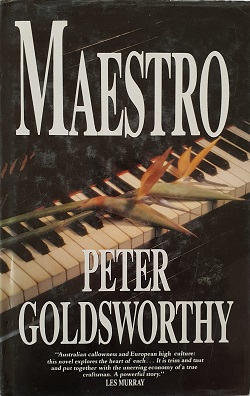
This Resource is for students studying Mainstream English in the Victorian Curriculum.
Place is integral to an understanding of the characters in Maestro by Peter Goldsworthy.
In some ways, the cities of Darwin, Adelaide and Vienna parallel the growth of the characters. In other respects, the character’s attitudes towards the cities reveal their motivations and, in the case of Keller, the mystery of his past. Darwin and Adelaide exemplify the most obvious and literal examples of the polarity of North and South.
“Up North” Darwin in the 1960’s – a Wild Frontier Town

“Up North” in the 1960’s traditionally represented the outpost of civilisation in Australia, with Darwin as its wild frontier town. In pre-Cyclone Tracy Darwin, there were few opportunities for public entertainment or cultural events. The town’s residents had a reputation for heavy drinking, fast driving and little regard for fine music or the arts. In 1967 few homes had air conditioning so that Darwin’s wet heat had to be alleviated with iced drinks, ceiling fans and evening sea breezes through louvred windows. Initially John Crabbe described Darwin’s inhabitants as “wife-beaters, fugitives from justice, alcoholics and maintenance dodgers” (p.17). Darwin was “the terminus … A town populated by men who had run as far as they could flee” (p.17).
Goldsworthy Portrays Life in Darwin as a Rhythm of Dramatic Contrasts
Life in Darwin is portrayed as a rhythm of dramatic contrasts between day and night, and the Wet and Dry seasons. Thunder is “the sound of February, of deepest, darkest Wet” (p.4). The Wet exaggerates nature in every way. The hard-drinking customers at The Swan where “it was always Wet season” (p.17), provide the background rhythm to Paul’s lessons with Keller and their wrangles over the choices of compositions for his lessons and practice. The change of season to the Dry marks an important point in the characters’ moods. Everyone’s mood is lightened and refreshed at the beginning of “seven months of clear, enamel-blue days” (p.28), when meals are taken outside in “a nightly cooling ritual” (p.30). Throughout the novel, Goldsworthy uses the imagery of night and day, Wet and Dry, sunshine and darkness to symbolise or illustrate his characters’ states of mind.
Darwin confronts the Crabbes with Physical and Mental Challenges
The Crabbes’ move to Darwin, a career promotion for John, confronts all three family members with both physical and mental challenges. To Paul, Darwin is a tropical paradise; to his parents it is, initially too hot, humid and uncivilised. John Crabbe declares Darwin is “A city of booze, blow, and blasphemy” (p.9) but Paul loves Darwin from the moment he steps off the plane from Adelaide: “I loved the town of booze and blow at first sight. And above all its smell: those hot, steamy perfumes that wrapped about me as we stepped off the plane, in the darkness, in the smallest hours of a January night. Moist, compost air. Sweet-and-sour air …” (p.9).
Goldsworthy Describes Darwin in Lush Descriptive Passages
Goldsworthy devotes considerable attention to crafting lushly descriptive passages which evoke Darwin’s exotic quality, its multicultural population and the strong emotions of sexuality. Paul delights in the dense foliage of their garden, at the “unnatural greenness” of leaves, and marvels at the brilliance of parrots, butterflies, huge insects and grubs: “Everything grew larger than life in the steamy hothouse of Darwin, and the people were no exception. Exotic, hothouse blooms” (p.11).
Darwin for Eduard Keller was an Exile

For Herr Eduard Keller, the maestro, Darwin was an exile, a self-imposed punishment stemming from his perceived responsibility for the deaths of his wife and child. Darwin is the maestro’s decision to live as far as possible, both literally and metaphorically from his cultured European background. Paul vividly remembers his first encounter with the maestro. He was fascinated by Keller: “I’d seen nothing like him before. He was short: migrant-height, European height…The hair above that flaming face was white, sparse, downy. On his red nose he had placed … a pince-nez… Above all, I remember the hands: those dainty, faintly ridiculous hands” (p.5). Despite Darwin’s oppressive heat, Keller is dressed in a white linen suit, crisp and freshly laundered. As Paul pushed his way through the drinkers in The Swan each Tuesday for his piano lesson, he found it “easy to place Keller among these fugitives” running away from things they chose not to remember.
